Kumbhakarna Spreads Terror
Ravana
heard the roar of the monkeys and learned that Rama and Lakshmana had both
recovered. Renewing his attack, he sent Dhumraksha out from the western gate
with a company of demons, riding on a golden chariot pulled by donkeys. A
fierce fight ensued, during which many were slain on both sides. For a while
Dhumraksha held the field, but he was soon dead, his limbs shattered beneath a
huge rock hurled by Hanuman.
Next
was Vajradamstra. He led his forces out from the southern gate, where he worked
into the midst of the monkey army, striking terror into their hearts. But
Angada hurled a mountain crag at him, smashing his chariot and throwing him to
the ground, then cut off his head, sending the panic stricken demons back
inside the city.
Ravana
now sent out the mighty Akampana with a horde of demons. Dust obscured the
armies and the earth grew muddy with their blood. Akampana slew many monkeys
then turned his onslaught on Hanuman, striking him with volleys of arrows. But
Hanuman struck him on the head with a big tree and the demon lost his life.
Downcast
at the news of Akampana's death, Ravana summoned Prahasta, his
commander-in-chief.
'I
urged you to return Sita and avoid this war,' protested Prahasta. 'Nevertheless
I am ready to defend you with my life.'
He
ascended his glorious chariot and sallied from the eastern gate with one-third
of Lanka's forces. The slaughter that ensued was terrible, creating a sea of
blood and broken limbs. Prahasta attacked Nila, covering him with arrows, but
Nila broke Prahasta's bow with a tree trunk. The two heroes tore at each
other's limbs until at last Nila broke a great rock over Prahasta's head,
ending his life and routing his army.
Angry
and dismayed at the death of Prahasta, Ravana decided he himself would have to
fight. Effulgent with mystic power, he led an army of gigantic demons out from
the gates. Fighting with his twenty arms he Cleaved a path through the monkey
army towards Hanuman.
'Remember
me? I killed your son Aksa; Hanuman taunted. 'You may be safe from gods and
demons, but beware of monkeys!'
Incensed,
Ravana dealt Hanuman a huge blow on his chest, knocking him to the ground, and
moved on. He then attacked Lakshmana and wounded him grievously with his
javelin, but Hanuman knocked Ravana aside and carried Lakshmana to safety,
where his wounds miraculously healed.
Rama
then attacked Ravana, destroying his chariot and weapons, and striking him with
a formidable arrow in his chest. III pain, the king of the demons ,dropped his
bow and slumped to the ground. Rama spared him his life, allowing him to
retreat into Lanka.
'Come
back with a fresh chariot,' shouted Rama, 'and fight me again. Then you will
discover my full strength.'
Defeated
and disgraced, Ravana re-entered Lanka. He remembered Brahma's warning: 'Beware
of humans'. He also remembered the curse of Vedavati, who foretold that she
would come back as a woman in a future life and be the cause of his death. But
he was not about to surrender.
'Wake
Kumbhakarna!' he ordered.
Kumbhakarna,
the brother of Ravana, was a monster who fed on flesh. Long ago when he was
born he started eating all living beings at a frightening speed. To save them
Brahma put him to sleep, allowing him to wake for only one day every six
months. Ravana now ordered him to be awakened, although he had slept for only
nine days.
Rakshasas
descended into his underground mansion of' gold, where his enormous form lay
buried in sleep. They sounded bells and drums but he did not stir. They struck
him with clubs and trampled on him, but still he slept soundly. Finally they
brought hundreds of elephants to walk all over him, and at last bestirred. He
yawned and stretched, calling for food, and they fed him on deer, buffalo and
pigs with vats of blood and wine.
'Why
have I been woken?' he growled. 'What danger faces Lanka?'
'The
city is besieged. Rama has put Ravana to flight, leaving him only with his
life.'
'I
shall conquer him and drink his blood!' roared the monster. Leaping from his
bed, he washed his face, and called for mote drink. After drinking hundreds
more barrels of wine he made his way full of excitement to his brother's
palace. When he learned From Ravana the full extent of his troubles, he
laughed.
'Did
I not warn you, brother, that you were foolish to keep Sita? Now you are
reaping the reward of your sinfulness and pride,' he chided. 'But never fear, I
will put your enemies to flight and devour Rama.'
Ravana
gave him a golden coat of mail and a huge golden pike. Maddened with the smell
of blood, he strode into battle surrounded by an army of giant rakshasas. When
the monkeys saw the colossal figure of Kumbhakarna step over Lanka's lofty
battlements and advance towards them they fled in terror. With great difficulty
Angada and Sugriva rallied them for the fight. Waves of monkeys attacked from
all sides hurling trees, rocks and mountain peaks at him, but the monster felt
no discomfort. He ploughed into their ranks, tossing them aside, trampling them
underfoot, crushing them in his arms ten or twenty at a time and greedily
thrusting them into his mouth until he was covered with their blood and gore.
Hanuman
was the first to halt his progress. He struck him with a mountain peak so
violently that the monster stumbled. But Kumbhakarna thrust his pike deep into
Hanuman's chest, forcing him to retire, vomiting blood. Thousands of monkeys
jumped on the demon and climbed all over him biting and scratching, but he
threw them off or pushed them into his gaping mouth. Angada and Sugriva each
attacked him with mountain peaks and Hanuman broke his pike. Lakshmana attacked
him with arrows, piercing deep into his chest and hurting him severely. But
Kumbhakarna wanted to fight Rama.
Finding
Rama, he rushed at him in fury. Rama shot an arrow into his breast, making him
bleed profusely. In delirium he ran amok, devouring all in his path, whether
monkey, demon or bear.
'Here
I am!' shouted Rama, 'ready to kill you.'
Laughing
insanely, Kumbhakarna charged again at Rama, brandishing an iron club in his
right hand. Rama released an arrow, powered by the Wind god, which severed
Kumbhakarna's right arm. The demon lifted a tree in his other arm, but Rama
severed that one too with another arrow, and with two more he cut off his feet.
Still he advanced, flying through the air with his horrific mouth open like a
gateway to hell. Rama took a golden arrow encrusted with diamonds and sent it
blazing through the air. It tore off the demon's head and mercifully brought an
end to Kumbhakarna's reign of terror. The earth shook, celestials gathered in
the sky to applaud and the monkeys went wild with joy.
The Fall Of Indrajit
The news of his
brother's death came as a terrible blow to Ravana. Now he realized he had been
wrong not to listen to Vibhisana's advice. Seeing his despair, his sons rallied
around him.
'You
can still defeat Rama,' they assured him. 'We will kill him ourselves.'
Ravana
felt his old enthusiasm return. His sons were, after all, powerful fighters who
could fly through the air and knew the magic arts. Together four of them went
out. They were met by fierce lighting and soon the ground was covered with the
blood of the contestants. One by one, Ravana's sons were slain by the fury of
the monkey-chiefs. Last to go was Atikaya, equal in might to Ravana. As he went
forth on his chariot, brilliant as a thousand suns, the monkeys thought he was
Kumbhakarna himself, come back to life.
Lakshmana
challenged him but he laughed, 'You are a mere boy, I advise you to leave
unless you want to die.'
Lakshmana,
however, was more than a match for him. Atikaya was protected by Brahma, so
only a weapon powered by Brahma could kill him. Lakshmana knew this and invoked
Brahma's blessing on his arrow, which cut off Atikaya's head.
With
all his sons, save Indrajit, killed in battle, Ravana at last recognized his
opponent as Vishnu himself, from whom there could be no defence. But Indrajit
would not allow him to give up the fight.
'You
will see Rama and Lakshmana lying dead on the battlefield today, killed by my
arrows,' he pledged.
Before
going to fight, Indrajit offered oblations into the sacred fire. The Fire god
rose dazzling from the flames to accept his offerings and gifted Indrajit with
the cloak of invisibility, which allowed him to move unseen on the battlefield.
He summoned his enchanted chariot, which flew through the air, and set off to
do battle, accompanied by monsters riding animals such as tigers, scorpions,
crows and serpents. This hideous assembly issued from the city gates, longing
for victory over their tormentors.
Indrajit
ranged the sky and began showering devastating arrows upon the leaders of
Rama's army. Moving like lightning, always hidden from view, he left them
helpless to defend themselves. His incessant barrage soon overpowered the
monkey chiefs and even Rama and Lakshmana. When he saw that they had all fallen
on the field of battle, Indrajit withdrew in exultation to the city of Lanka.
However,
Vibhisana and Hanuman had survived Indrajit's onslaught. Roaming the scene of
devastation Vibhisana discovered Jambavan, lying wounded on the ground. The
venerable bear whispered to him.
'Does
Hanuman live?'
'Yes,'
answered Vibhisana, 'but why do you only enquire of Hanuman?'
'Because
he has the power to save us all. In the northern marches of the Himalayas,
between the lofty peaks of Kailasha and Rishabha, is a mountain thick with
healing herbs. Among them are four herbs of unmatched potency: the herb which
brings the dead to life, the herb which heals wounds, the herb which mends
broken limbs and the herb which revitalizes the entire body. These rare herbs
must be collected by Hanuman if we are to survive.'
Hanuman
was soon coursing through the air on his way north. He passed over forests,
cities, fertile plains and rivers and drew near to the mountain fastness of the
Himalaya range, whose white peaks shone like clouds. Among them he found the
mountain of herbs, just as Jambavan had said, and searched all over it for the
precious medicines. Unable to find them he tore the summit from its roots and
bore it away to Lanka. When he brought it to the battlefield, the fragrance of
the herbs wafted over the wounded and healed their wounds. In addition, all,
those monkeys who had died in the battle were restored to life. The demons,
however, had thrown all their dead into the ocean to conceal their numbers and
hence none was saved.
When
they came to know of the revival of the monkey army, other demon champions came
forward to fight, but they all perished, killed by Sugriva, Hanuman and Rama.
The monkeys' fighting spirit was high, while all looked bleak for the demons.
Indrajit desperately thought how to discourage Rama and his army. If he could
convince Rama that Sita was dead, surely Rama would give up in despair and
Lanka would be saved. He used his sorcery to conjure up an illusory image of
Sita, placed her on his chariot, and drove before the opposing army with a company
of demons.
Hanuman
was astonished to see on Indrajit's chariot the figure of Sita. Her torn sari
and pale, beautiful face were distinctly recognizable. But what was Indrajit
doing with her? The demon took hold of her hair and dragged her towards him,
beating her mercilessly. Hanuman was enraged. He surged forward with other
monkeys intent on stopping Indrajit.
You
are pitiless and cruel. By this foul act you are sending yourself to hell!'
'I
agree that this woman should not be killed,' taunted Indrajit, but sometimes
such things must be done in war. Watch me as I kill this princess, so dear to
Rama.' Hanuman looked on in horror as he raised his sharpened sword and with a
single stroke clove her in two, spilling her blood in his chariot. Enraged,
Hanuman flew at Indrajit and aimed a huge rock to crush him and his chariot.
But Indrajit speedily withdrew, leaving his army to be decimated by the
outraged monkeys.
Hanuman
told Rama the ghastly news. When Rama heard it he fell to the ground like a
fallen tree and went into a deep depression. Lakshmana hurried to comfort him.
Bewildered by this unforeseen turn of events, the two brothers remained in a
state of shocked disbelief until Vibhisana arrived on the scene. When he was
told what had happened he knew straight away that this was a trick of
Indrajit's. He patiently explained to Rama the truth.
'Ravana
would never allow Sita to be killed he is too attached to her. This is a trick
of Indrajit's, who loves to use his sorcery to delude his opponents. Even now
he is at the fire sanctuary preparing offerings for the Fire god. Twice already
he has overcome us through occult means, and if he is allowed to complete one
more such ritual, he will become invisible again and gain sufficient powers to
defeat us for good. We must prevent him. Let me take Lakshmana to that place to
finish Indrajit once and for all.' Rama gave his blessings and they hurried off.
On
the way Vibhisana asked Hanuman to launch an attack on the demon army so as to
force Indrajit to leave his sanctuary to fend them off. Hanuman led the
onslaught, armed with rocks and trees, and before long they had put the demon
army to flight. Sure enough, Indrajit appeared in rage to defend them.
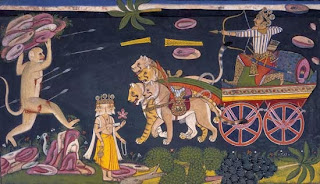 While
Hanuman did this Vibhisana and Lakshmana reached the place of sacrifice.
Leading him through a dense thicket of ancient trees, Vibhisana brought
Lakshmana to a clearing around a blackened banyan tree which spread its hoary
branches over the fire sanctuary. Smoke rose from the fire-pit which was
surrounded by ritual artifacts, and female attendants waited for Indrajit, who
had evidently left in a hurry and was expected back. Suddenly Indrajit
appeared, alerted by his aides of their presence in his inmost sanctuary.
Deeply angered, he turned upon Vibhisana.
While
Hanuman did this Vibhisana and Lakshmana reached the place of sacrifice.
Leading him through a dense thicket of ancient trees, Vibhisana brought
Lakshmana to a clearing around a blackened banyan tree which spread its hoary
branches over the fire sanctuary. Smoke rose from the fire-pit which was
surrounded by ritual artifacts, and female attendants waited for Indrajit, who
had evidently left in a hurry and was expected back. Suddenly Indrajit
appeared, alerted by his aides of their presence in his inmost sanctuary.
Deeply angered, he turned upon Vibhisana.
'You
are Ravana's brother and my uncle, yet you have become our enemy, and now you
have betrayed my secret. I despise you for this.'
'Although
I was born a demon, that is not my nature,' replied Vibhisana. 'I have chosen a
different path, driven away by the sinfulness of my family.'
Indrajit
turned with contempt to Lakshmana.
'Have
you come for more punishment? Do you forget that twice already I have crushed
you? Stay then and fight, and I will fill you with arrows that will consume you
as fire consumes a ball of cotton. So saying, he loosed a volley of arrows that
pierced Lakshmana through, hissing like serpents. Lakshmana replied with Ave
steel shafts that penetrated deep into his chest. And so the duel went, each
displaying daz-zling skills and strength, and seemingly invulnerable to the
other's arrows. They deployed cosmic weapons against each other until they had
exhausted their arsenals. Gradually Indrajit, without the benefit of his
invisibility, began to weaken in the face of Lakshmana's fury.
Lakshmana
invoked the glorious weapon of Indra, awarded to him by Vishvamitra in his
youth. He took the arrow, fretted with gold and guided by delicate feathers,
and fitted it to his bow. Chanting mantras to Indra and invoking the name of
Rama, he drew the arrow back to his ear, then released it. It flew straight and
true and severed Indrajit's head from his shoulders.
The
gods, watching from the sky, showered flowers on Lakshmana and praised his
deed. Rama hugged him close, soothing his injured limbs and ridding him of' all
pain. With the help of the healing herbs he soon recovered from his ordeal.
They all looked forward to the final showdown with Ravana.
The End Of Ravana
Ministers
hastened to Ravana with the news of Indrajit’s demise. Stunned, the lord of
demons fell into a nerveless state, pondering his great loss. After some time
he stirred, knitting his brows and grinding his teeth. He screamed, venting
smoke and flames from his cavernous mouth, and seized his razor-edged sword,
resolving to put an end to Sita, the cause of all his troubles. He swept out of
his chambers, sending courtiers scurrying for shelter, and hurried down to the
ashok grove, anxiously followed by his ministers and his wife Mandodari. Sita
saw his purposeful approach and the long sword at his side and thought her life
was at an end. 'Weak with fear and resignation, she bowed her head and waited.
Suddenly an elderly minister, Suparsva, spoke up. `
Surely
you will not do this heinous crime? Since childhood you have honoured your
religion. Will you now destroy all your merits in one instant by murdering an
innocent woman? Turn your anger on Rama, not on this helpless princess!'
Ravana
heeded these words of his trusted adviser and withdrew his sword. With this
friend of his he returned to his council chamber.
Ravana
believed himself' invulnerable. He had a coat given to him by Brahma that was
impenetrable, even by the arrows of Indra. He therefore determined to kill Rama
and Lakshmana himself. He ordered his remaining generals to gather whatever was
left of his army still an enormous force and go ahead, with him Following them
to complete the task.
The
great army advanced from the city, flying colourful banners and bristling with
weapons. But this was not to be their day. Rama put on such a display of' fighting
power that even he was astonished. So fierce was his onslaught and so swift his
progress, that the demons could not actually see him as he destroyed them. As
one cannot see a hurricane flattening a forest, they could only see their
warriors falling on all sides. At other times it seemed to them they saw not
one but hundreds of Ramas. He became like the wheel of Time, bringing death to
all who looked upon him. Within two hours, he exterminated the entire demon
army with his fire-laden arrows, save a few who managed to escape.
Lanka
was filled with the bitter tears of the demon's wives, sisters and daughters.
'We
blame Surpanakha,' they cried. 'That ugly and deformed creature should never
have touched the handsome Rama. Nor should Ravana have stolen Sita once he saw
how easily Rama disposed of his cousins Khara and Dusana. Later the invincible
demons Viradha and Kabandha, and even Vali the powerful monkey king were all
effortlessly killed by Rama, but still this obstinate Ravana will not release
Sita. Now he has caused the death of our husbands and brothers.'
Ravana
heard their wailing and bit his lips in rage. Gathering the remnants of his
once great army, and the few generals to have survived the morning's holocaust,
he rode out to face Rama. His chariot was resplendent with jewelled pillars and
golden domes, and equipped with a huge arsenal of celestial missiles. Rows of'
tiny bells jingled as it moved across the field, pulled by eight horses. But
just then a vulture alighted on top of the chariot, other birds gave harsh
cries, his left eye twitched and his face grew pale, while across the heavens
flamed a meteor. Heedless of these omens, Ravana advanced to his doom.
The
fighting went against him, and soon his generals were killed by Sugriva and
Angada, leaving Ravana virtually alone. Full of rage, he invoked a spell in the
name of Rahu, the planet of darkness that eclipses the moon, and cast it over
the monkey army, destroying many of them. Then he turned his attention towards
Rama, and the two of' them entered a full-scale contest of arms. As they circled
each other loosing thunderous missiles charged with mystic potencies, the sky
darkened and all creatures felt oppressed with fear. Although each was pierced
repeatedly by the other's shafts, neither felt pain.
Ravana's
arrows flew towards Rama, manifesting heads of lions, vultures, snakes and
wolves with open jaws projecting sharpened teeth. Rama met them with arrows of
fire appearing like suns, moons, meteors and comets.
Lakshmana
and Vibhisana joined the attack, breaking Ravana's bow and killing his horses,
forcing him to jump to the ground. Enraged, Ravana took up a javelin invested
with deep magic, hung with eight bells and shining like fire, and launched it
at Lakshmana with a sound like thunder. Rama, seeing it closing on Lakshmana,
chanted mantras for his protection, but the javelin sank deep into Lakshmana's
chest and Felled him like a stone.
Rama
rushed to Lakshmana's side fearing the worst, and with great difficulty
extracted the shaft from his chest. But he showed no signs of life. Rama, his
eyes full of tears, entrusted him to the care of Susena, the monkey physician,
and swore that he would put an end to Ravana that very day.
When
Susena saw Lakshmana's serious condition, he called for Hanuman to collect more
precious herbs from the Himalayas. Hanuman again set off north for the mountain
of herbs. Reaching there, he broke off a further crag from its summit and
hastened back to the scene of the battle. Susena selected a herb called
Visalyakarani, which has the power to expel from the body any weapon that has
penetrated it and to heal the wound made by its entry. He crushed the herb and
administered it through Lakshmana's nostrils, curing him instantly. Lakshmana
stood up, all pain and injury gone, and was embraced by Rama and cheered by the
monkeys.
The
time for the final act of war had-arrived: the destruction of Ravana. lndra,
the king of heaven, decided it was time to give Rama some help. He summoned his
trusted charioteer, Matali, and sent him and his chariot to Rama's assistance.
All at once Indra's chariot swept down from the skies and halted before Rama,
hovering in the air with its bells tinkling. Rama and Lakshmana recognized it
as the same golden chariot, yolked to four green horses, that they had seen at
Sarabhanga's ashram in the forest at the start of their exile. Matali greeted
Rama and invited him to mount the chariot, holding Indra's shining armour and
celestial weapons.
Rama
mounted the chariot, which lit up the battlefield with its splendour, and set
off in pursuit of Ravana. The combat was opened by Ravana, who released a
demoniac missile which turned into thousands of snakes shooting fire from their
mouths, assailing Rama from all directions at once. In reply Rama invoked the
weapon of Garuda, the bird-carrier of Vishnu and enemy of all snakes, which
produced thousands of golden eagles who devoured the snakes.
Ravana
then raised another javelin, covered with spikes like mountain peaks and
wreathed with fire and smoke around its point. It screamed through the air at
Rama, threatening to destroy him and his entire army, but Rama countered it
with a javelin of his own. When the two weapons collided the explosion
illuminated the skies and showered fragments on the ground.
Rama
shouted at Ravana, If I had been there when you stole Sita, I would surely have
killed you then. But now that I do have you in my sight I will despatch you to
the abode of death. Today vultures will feast on your heart and drag away your
severed head as you lie shattered on the battlefield.'
The
magical weapons Rama had received as a youth from Vishvamitra now came before
him ready for his use, and Rama covered Ravana with arrows that bit deep into
his body. The demon sank back in his chariot without the strength to fight on.
Seeing this, his charioteer hastily retreated from the battlefield to give him
time to recover.
While
he was gone, the sage Agastya, who had been observing the fight from the skies,
came to Rama's side. He recited in his ear the heart mantra in praise of the
sun, which addresses the supreme God through the power of the sun, and allays
all anxieties.
"He
alone creates, sustains and destroys all that lives"; he chanted, "He
lives in the hearts of all beings, awake while they sleep, and is the supreme
controller of all activities. All who remember him will be victorious".
Hearing
these divine words, Rama was rid of all fatigue and sorrow, and felt renewed
vigour and determination. Soon Ravana's chariot returned with a sound of
thunder and Rama took up Indra's bow to finish his task. Vultures circled
around Ravana in a darkening sky, meteors coursed through the heavens, thunder
rolled even without clouds, and blood rained down on his chariot. As the
contest reached its climax, all warriors on the field, both monkeys and demons,
stood motionless and watched in amazement. The denizens of heaven, observing
from the sky, anxiously called out to Rama.
'May
all be well with you. Delay no longer. Conquer this demon now.'
Rama
fired a golden arrow which took the form of a serpent as it sped towards
Ravana. It severed his head, but another head appeared on Ravana's shoulders.
Again Rama cut it off and again it was replaced. Rama exhausted hundreds of
arrows in this way, and the unceasing struggle passed through days and nights,
neither gaining mastery over the other.
Seeing
the situation, Rama's charioteer, Matali, advised him. 'The hour of Ravana's
doom has come. To kill Ravana you must use the dreaded arrow of Brahma, given
to you by Agastya, which never misses its target.'
Rama
took out that arrow, in whose feathers resided the Wind god, in whose tip was
the Sun god and the Fire god, whose shaft was made of ether and which was
itself the essence of all elements. He charged it with its mystic mantra and
dispatched it at Ravana with the speed of sound. Flaming and spitting, covered
in smoke, it penetrated the heart of the king of the demons. Ravana's body fell
lifeless to the ground.
All
at once a breeze whipped up, dispersing the foul odours of the battlefield. The
sky cleared and the sun shone with a warm glow. Flowers rained down and
heavenly music echoed from the sky. Demons melted into the shadows while
monkeys rejoiced and came forward to honour Rama, who was surrounded by his
faithful Friends on earth and glorified by celestial beings in the sky.
Writer Name: Ranchor Prime
 While
Hanuman did this Vibhisana and Lakshmana reached the place of sacrifice.
Leading him through a dense thicket of ancient trees, Vibhisana brought
Lakshmana to a clearing around a blackened banyan tree which spread its hoary
branches over the fire sanctuary. Smoke rose from the fire-pit which was
surrounded by ritual artifacts, and female attendants waited for Indrajit, who
had evidently left in a hurry and was expected back. Suddenly Indrajit
appeared, alerted by his aides of their presence in his inmost sanctuary.
Deeply angered, he turned upon Vibhisana.
While
Hanuman did this Vibhisana and Lakshmana reached the place of sacrifice.
Leading him through a dense thicket of ancient trees, Vibhisana brought
Lakshmana to a clearing around a blackened banyan tree which spread its hoary
branches over the fire sanctuary. Smoke rose from the fire-pit which was
surrounded by ritual artifacts, and female attendants waited for Indrajit, who
had evidently left in a hurry and was expected back. Suddenly Indrajit
appeared, alerted by his aides of their presence in his inmost sanctuary.
Deeply angered, he turned upon Vibhisana. 
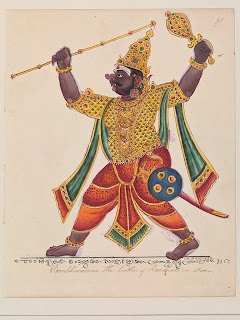
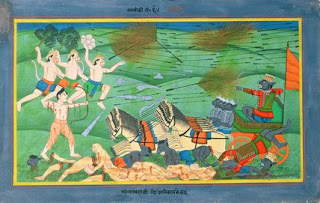
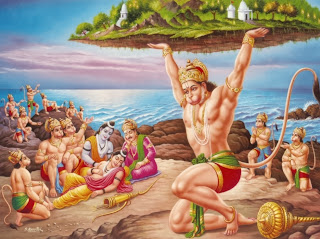
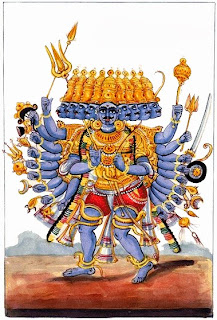
.jpg)










0 Response to "About of Rama Victorious"
Post a Comment